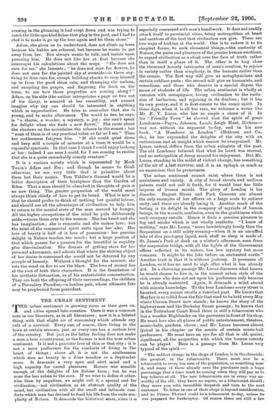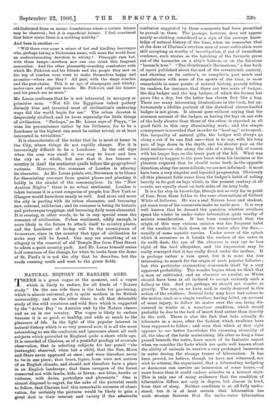THE URBAN SENTIMENT.
THE urban sentiment is growing rarer as time goes on, and cities spread into counties. Once it was a common note in our literature, as in all literatures ; now it is a belated thing, with that slight air of coxcombry which attends any cult of a survival. Every one, of course, likes living in the town at certain seasons, just as every one has a certain love of the country. But just as the latter feeling does not make a man a true countryman, so the former is not the true urban sentiment. It is not a patriotic love of this or that city ; it is not a mere preference for the comforts of living in the heart of things ; above all, it is not the soullessness which sees no beauty in a June meadow or a September moor. It demands a very open and alert mind and a high capacity for varied pleasures. Horace was sensible enough of the delights of his Sabine farm ; but he was none the less urban to the core. If we were to define it other- wise than by negatives, we might call it a special zest for civilisation,—not civilisation as an abstract quality of the mind, but civilisation with all the small and intimate com- forts which man has devised to fend his life from the rude sim- pliaity of Nature. It demunds the historical sense, since it is especially concerned with man's handiwork. . It does not readily attach itself to provincial cities, being metropolitan at heart and emulous of the best that civilisation can give. There are two ways of looking at the world. One is to reduce it to its simplest forms, to seek elemental things,—the austerity of Nature, the pains and pleasures of the greater human emotions, to regard civilisation as a cloak over the face of truth rather than in itself a phase of it. The other is to hug close the thousand homely intricacies of man's creation, to rejoice in variety rather than simplicity, in the humane rather than the cosmic. The first way will give us metaphysicians and certain sublime poets ; the second will give us humanists, and comedians, and those who deserve in a special degree the name of students of life. The urban sentiment is wholly at variance with metaphysics, loving civilisation to the exclu- sion of barbarism, and rejoicing in its dualism ; but it has its own poetry, and it is first-cousin to the comic spirit. In these days, when it is all too rare, we welcome a writer like Mr. E. V. Lucas, who has so ample a share of it. In his "Friendly Town" he showed that the spirit of great Londoners--Pepys, Johnson, Lamb, Leigh Hunt, Dickens— was not without its exponent to-day, and in his new book, "A Wanderer in London" (Methuen and Co., 68.), he has expounded the delights of the city with an enthusiasm and an insight which cannot be overpraised. Mr. Lucas, indeed, differs from the urban eulogists of the past. The old Londoner believed that what he loved was eternal, and no anticipation of decay marred his enjoyment. But Mr. Lucas, standing in the midst of violent change, has something of the air of a last survivor, and it is an epitaph as much as an encomium that he pronounces. •
The urban sentiment cannot exist where there is not quaintness and variety. A city of broad streets and uniform palaces could not call it forth, for it would bear too little impress of human moods. The glory of London is her disorder. Regent Street and Park Crescent are almost the only examples of her efforts on a large scale to achieve unity, and these are already losing it. Another mark of the feeling is its delight in the company of myriads of human beings, in the warmth, confusion, even in the grubbiness which such company entails. Hence it finds a genuine pleasure in fog and smoke which is not wholly aesthetic. "I know Of nothing," says Mr. Lucas, "more bewitchingly lovely than the Serpentine on a still misty evening—when it is an unruffled lake of dim pearl-grey liquid, such stuff as sleep is made of. St. James's Park at dusk on a winter's afternoon, seen from the suspension bridge, with all the lights of the Government offices reflected in its waters, has less mystery but more romance. It might be the lake before an enchanted castle." Another trait is that it is without jealousy. It possesses all London, so it has no need to sigh after what it has already got. In a charming passage Mr. Lucas discusses what houses be would choose to live in, in the correct urban style of the rich owner who does not act upon his preference only because he is already contented. Again, it demands a mind stored with minute knowledge. To the true Londoner every street is haunted, every corner recalls a vanished past. He knows that Mayfair is so called from the fair that used to be held every May where Curzon Street now stands ; he knows the story of the highwayman and the Berkeley Street passage; he knows that in the Tottenham Court Road there is still a tobacconist who has a wooden Highlander on the pavement in front of his shop. He must love also all places of public entertainment, theatres, music-halls, gardens, shows ; and Mr. Lucas becomes almost lyrical in his chapter on the merits of certain music-hall performers. He must have an eye for all that is old, quaint, significant, all the properties with which the human comedy can be played. Here is a passage from Mr. Lucas very typical of the spirit :—
" The saddest change in the shops of London is in the chemists: the greatest, in . the tobacconists. There must now be a . tobacconist to every ten Men of the population, or something near it, and many of these already save the purchaser such a huge percentage that a time must be coming when they will pay us to buy tobacco at all. The new tobacconists are in every way un- worthy of the old : they know no repose, as a tobacconist should ; they serve you with incredible despatch and turn to the next customer. To loiter in one of their shops is beyond consideration, and no Prince Plorizel could be a tobacconist to-day, unless he was prepared for bankruptcy. Of course there are still a few
old-fashioned firms on secure foundations where a certain leisure may be observed ; but it is superficial leisure. I feel convinced that below stairs there is a seething activity."
And here is another :—
" Will there ever come a mixer of hot and kindling beverages who, perhaps taking a Dickensian name, will wean the world from an undiscriminating devotion to whisky ? Pineapple rum hot, with three lumps—nowhere now can one drink this fragrant concoction. And the other pleasantly-sounding comforters with which Mr. Pickwick and his friends and the people they met on the top of coaches were wont to make themselves happy and aromatic—where are they ? AU past, with the stage coaches and the post-chaise. This is an age of champagne and whisky, motor-cars and religious novels. Mr. Pickwick and his leisure and his punch are no more."
Mr. Lucas confesses that he is not interested in savagery or primitive man. "Not till the Egyptians baked pottery divinely blue and invented most of civilisation's endearing ways did the world begin for me." The urban devotee is desperately civilised, and he loves especially the little things of civilisation. "Perhaps," as Mr. Lucas says of Pepys, "he wins his pre-eminence rather by his littleness, for to be a Londoner in the highest one must be rather trivial, or at least interested in trivialities."
It is characteristic of the writer that he is most at home in the City, where things do not rapidly change. For it is increasingly difficult to be a Londoner. In the old days when the area was small it was easy to know and love the city as a whole, but now that it has become a country in itself the sentiment quails before the geographical vastness. Moreover, the romance of London is altering its character. As Mr. Lucas points out, Stevenson is to blame for dissociating romance from quaint places and planting it boldly in the citadel of the commonplace. In the "New Arabian Nights" there is no urban sentiment. London is taken because it is a vast congeries of people, but New York or Glasgow would have done nearly as well. And more and more the city is parting with its urban character, and becoming new, rational, utilitarian; and its romance is losing its historic and picturesque trappings, and becoming daily more elemental. It is ceasing, in other words, to be in any special sense the romance of civilisation. Urban sentiment, oddly enough, is more likely in the future to attach itself to country places, and the Londoner of to-day will be the countryman of to-morrow, since in the country that type of civilisation he seeks may still be found. One may see something of an allegory in the removal of old Temple Bar from Fleet Street to adorn a quiet country park. And Mr. Lucas himself seems half conscious of the change, for when he looks from the dome of St. Paul's it is not the city that he describes, but the roads running south and west to the green fields.







































 Previous page
Previous page